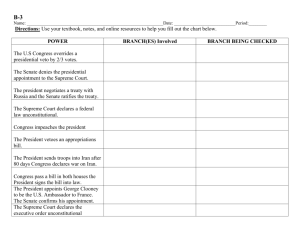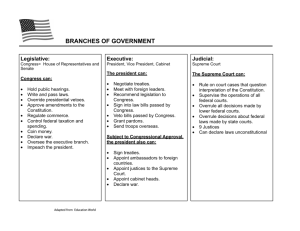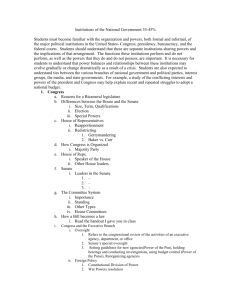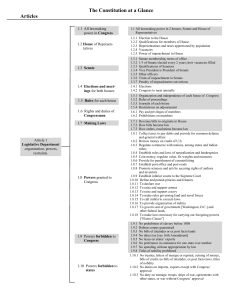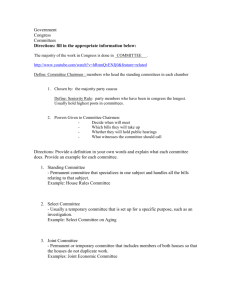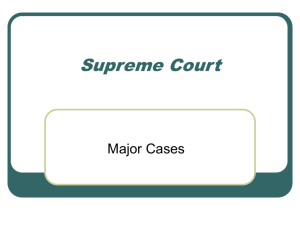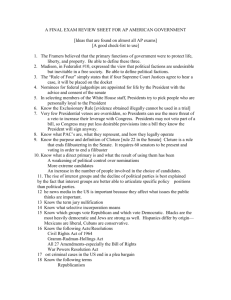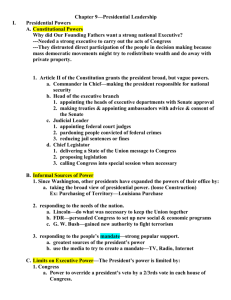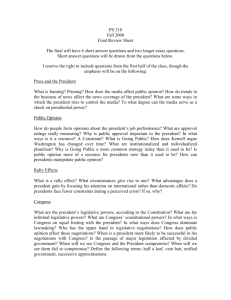Civics Chapters 6
advertisement
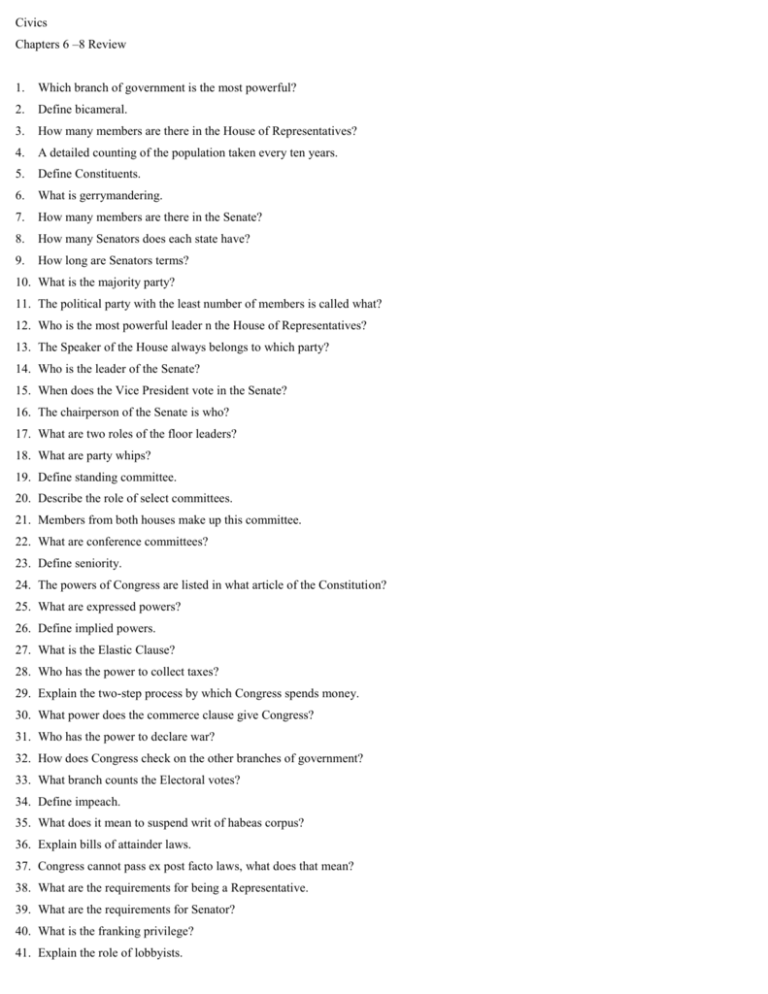
Civics Chapters 6 –8 Review 1. Which branch of government is the most powerful? 2. Define bicameral. 3. How many members are there in the House of Representatives? 4. A detailed counting of the population taken every ten years. 5. Define Constituents. 6. What is gerrymandering. 7. How many members are there in the Senate? 8. How many Senators does each state have? 9. How long are Senators terms? 10. What is the majority party? 11. The political party with the least number of members is called what? 12. Who is the most powerful leader n the House of Representatives? 13. The Speaker of the House always belongs to which party? 14. Who is the leader of the Senate? 15. When does the Vice President vote in the Senate? 16. The chairperson of the Senate is who? 17. What are two roles of the floor leaders? 18. What are party whips? 19. Define standing committee. 20. Describe the role of select committees. 21. Members from both houses make up this committee. 22. What are conference committees? 23. Define seniority. 24. The powers of Congress are listed in what article of the Constitution? 25. What are expressed powers? 26. Define implied powers. 27. What is the Elastic Clause? 28. Who has the power to collect taxes? 29. Explain the two-step process by which Congress spends money. 30. What power does the commerce clause give Congress? 31. Who has the power to declare war? 32. How does Congress check on the other branches of government? 33. What branch counts the Electoral votes? 34. Define impeach. 35. What does it mean to suspend writ of habeas corpus? 36. Explain bills of attainder laws. 37. Congress cannot pass ex post facto laws, what does that mean? 38. What are the requirements for being a Representative. 39. What are the requirements for Senator? 40. What is the franking privilege? 41. Explain the role of lobbyists. 42. Define casework. 43. What are pork-barrel projects? 44. Around how many bills are introduced each term? 45. What is the difference between private bills and public bills? 46. A joint resolution is what? 47. Where do the ideas for bills come from? 48. What are special interest groups? 49. Who can introduce a bill to Congress? 50. What are riders? 51. When a member of Congress tries to talk a bill to death this is called what? 52. Define cloture. 53. What is a voice vote? 54. A sanding vote is what? 55. Explain a roll-call vote. 56. What does it mean to veto a bill? 57. Explain pocket veto. 58. List the qualifications for president. 59. What are the traits all U.S. presidents have had in common? 60. How often are Presidents elected? 61. How are Presidents elected? 62. Define electors. 63. How many electoral votes does it take for a person to win the Presidency? 64. How long is the term for President? 65. What is important about the 22nd amendment to the president? 66. The yearly salary for the president is what? 67. Qualifications for the Vice President are what? 68. List the order of presidential succession according to the Presidential Succession Act of 1947. 69. In what article of the Constitution are the powers of the president listed? 70. What are four powers given to the President by the Constitution? 71. Define executive orders. 72. Declarations of forgiveness are called what? 73. An order to delay a person’s punishment. 74. What is amnesty? 75. Who can order troops into battle? 76. How many times has the president sent troops into battle? 77. How many times has Congress declared war? 78. When was the War Powers Act passed? 79. Explain the War Powers Act. 80. Define foreign policy. 81. What is the goal of foreign policy? 82. The ability to keep the nation safe from attack or harm is called what? 83. Explain international trade. 84. Define treaties. 85. What is NATO? 86. An executive agreement is agreement between what two groups? 87. An official representative of a countries government. 88. What is the purpose of trade sanctions? 89. An embargo prohibits countries from doing what? 90. List three roles of presidential advisors. 91. Who is the most powerful member of the President’s cabinet? 92. What is the job of the Office of Management and Budget? 93. What cabinet helps the President coordinate the military and foreign policy? 94. Who created the Office of Homeland Security? 95. What groups are included in the Homeland Security? 96. The Attorney General heads what department? 97. List the three basic jobs of the bureaucracy. 98. What are independent agencies? 99. These corporations are like private businesses but the government owns and operates them. 100. Who are political appointees? 101. Civil service workers make up what percent of national government employees? 102. Explain the civil service system. 103. What is the Spoils System? 104. All accused people have the right to what two things? 105. What Article established the Supreme Court? 106. List the three levels in the court system. 107. Define jurisdiction. 108. List the 8 areas that the federal court has jurisdiction over. 109. Define exclusive jurisdiction. 110. What is concurrent jurisdiction? 111. Where are the courts where trials are held and lawsuits are began? 112. What court reviews decisions made in lower courts? 113. Define circuit. 114. Define remand. 115. Do appeals courts decide guilty or innocence? 116. What does an appeals court decide? 117. Define precedent. 118. How many justices are there on the Supreme Court? 119. Who appoints Supreme Court justices? 120. Who approves Supreme Court Justices appointments? 121. What is the job of the Supreme Court? 122. How many chief justices are there on the Supreme Court? 123. What does it mean if a law is constitutional? 124. Define judicial review. 125. What case established judicial review? 126. What is a docket? 127. What are the 5 steps each case must go through? 128. Define majority opinion. 129. What is the dissenting opinion? 130. Who writes the concurring opinion? 131. Define precedent. 132. What term means “let the decision stand”? 133. What was the outcome of Plessy v. Ferguson? 134. What case established separate but equal was unconstitutional?


